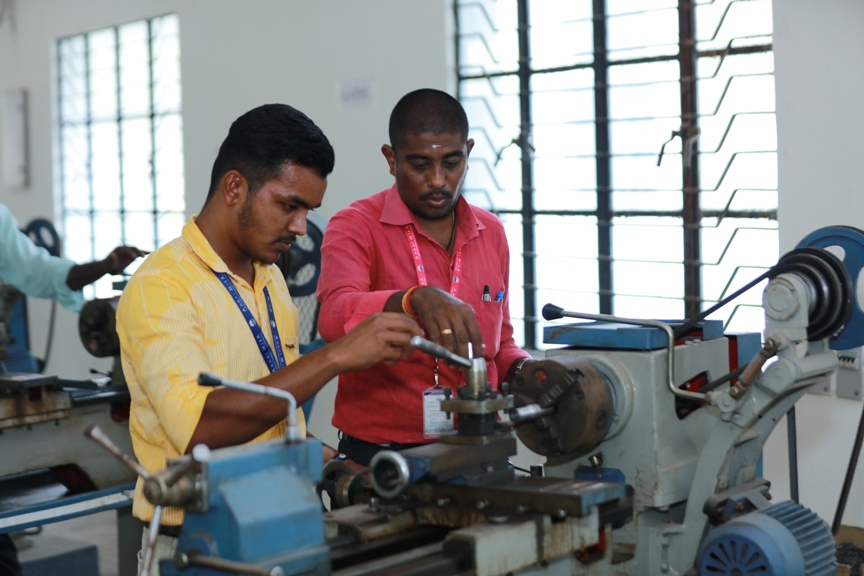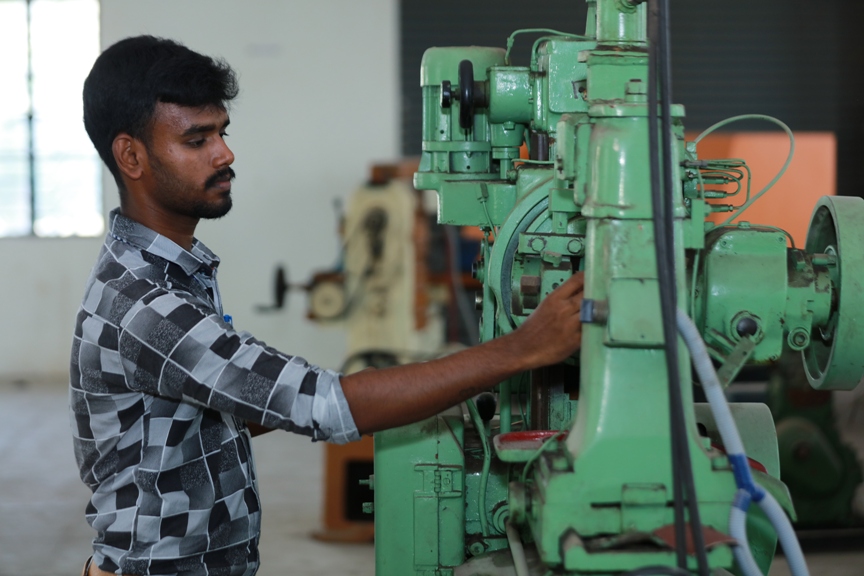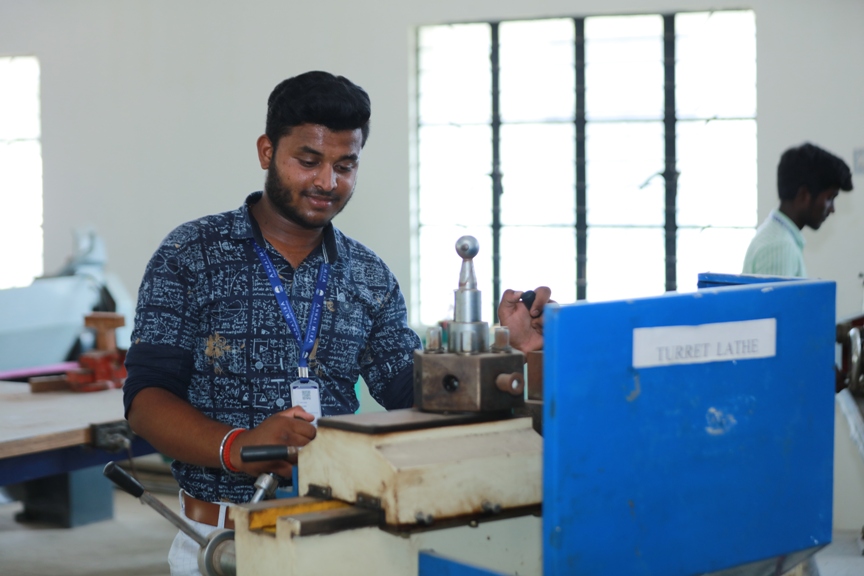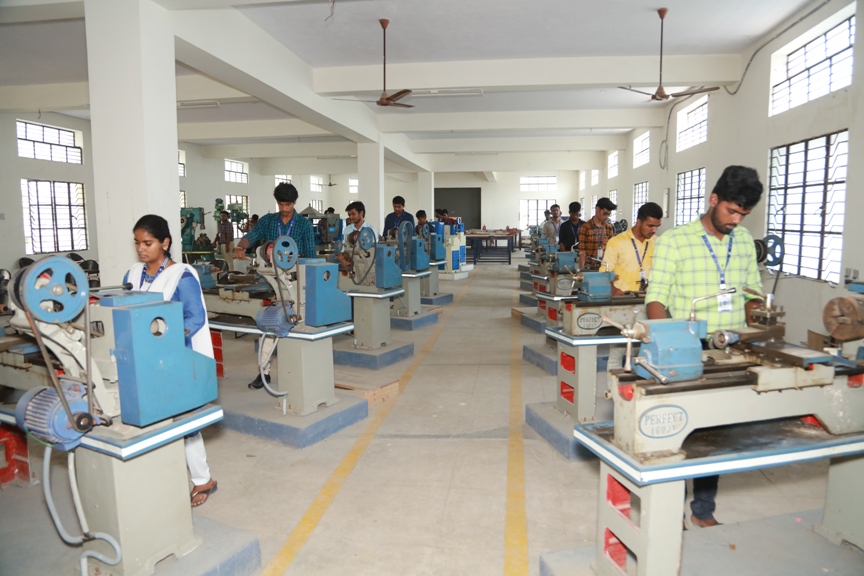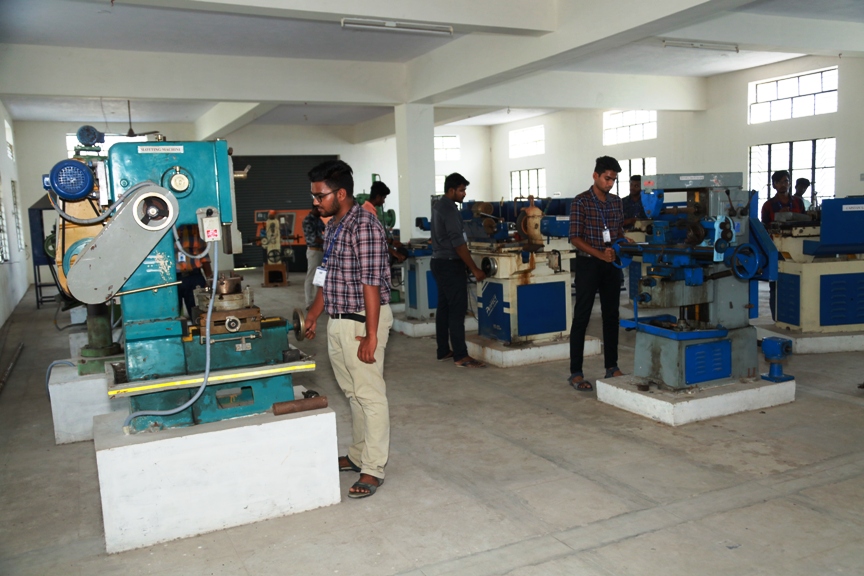- Email: [email protected]
- Mobile: 94433 04963
- Careers
- Contact Us
- Follow Us:
Admissions Hotline - 99523 87017
Laboratories
- Engineering Practices Laboratory
- Manufacturing Technology Laboratory
- Strength of Materials and Fluid Mechanics and Machinery Laboratory
- Kinematics and Dynamics Laboratory
- Thermal Engineering Laboratory
- Metrology and Measurements Laboratory
- CAD / CAM Laboratory
- Mechatronics Laboratory
The study of workshop practice acts as the basis for further technical studies. Basic workshop practices are included in the curriculum to provide hands-on experience about the use of different engineering materials, tools, types of equipment, and processes that are common in the engineering field. We have a modern well-established workshop, equipped with various traditional as well as most modern machines and latest tools and instruments. It imparts basic knowledge of various tools and their use in different sections of manufacture such as Fitting, Carpentry, Smithy, Plumbing, Sheet metal work, Lathe Shop, etc.
This laboratory is aimed at providing an introduction to the Know-how of common processes used in industries for manufacturing parts by removal of material in a controlled manner.
Also to enhance students to study and practice the various machining operations that can be performed in the lathe, shaping, drilling, milling, etc. and equip students with the practical knowledge required in the manufacturing/production companies.
This lab helps students to study and practice the basic machining operations in special purpose machines and acquire its applicability in the real-time components manufacturing industries.
The objectives of this laboratory are to impart practical knowledge on the design and analysis of mechanisms for the specified type of motion in a machine. With the study of rigid body motions and forces for the transmission systems, machine kinematics and dynamics can be well understood.
Demonstration exercises are provided with a wide variety of transmission element models to understand machine kinematics. Various experiments with governors, gyroscopes, balancing machines, and vibration are available to understand machine dynamics. Various commonly used mechanisms and their inversions are also available.
The Fluid Mechanics laboratory is actively engaged to reinforce and enhance understanding of the fundamentals of Fluid Mechanics. The experiments here are designed to demonstrate the applications of the basic fluid engineering principles and to provide more intuitive and physical Understanding of the theory. The Fluid Mechanics lab is equipped with different flow measuring set-ups such as Venturi meter, Orifice meter, Turbines, various Pumps etc. where students can visualize the basic theory of working of the fluid.
In engineering practice, basic and applied research in thermodynamics and heat transfer is increasingly important today since these play a crucial role in the design of vehicles, power and process plants, cooking and heating devices and even IC chips, among other things. Performance enhancement of any such devices is a constant endeavour which can be achieved through the studies of heat transfer. Through the course of this lab, one can understand the basic concepts of heat transfer by conducting experiments practically. This course mainly throws light on understanding of three modes of heat transfer such as conduction, convection and radiation and heat transfer by phase change. It covers experiments such as determination of thermal conductivity of metal rod, heat transfer through composite wall, natural and forced convection heat transfer, transient heat conduction, heat transfer through fins under natural and forced convection conditions, determination of Stefan-Boltzman constant and emissivity of grey surfaces, boiling and condensation and performance test on vapour compression refrigerator and air conditioner.
Metrology, the science of measurement, helps manufacturers to attain the proper fit and finish for their products. It embraces both experimental and theoretical measurements and determinations at any level of uncertainty in any field of science and technology. Metrology and measurements Lab plays a crucial role for a student who wants to pursue his career in industrial engineering and shop floor control.
The students learn the measurement procedure in basic measuring instruments such as thread micrometer, gear tooth vernier, lever dial gauge, GO-NO gauges and centre distance gauge other than normal micrometer and vernier calliper used in shop floor. The calibration exercise makes them to find the standard error involved in the measuring instrument using set of slip gauges.
In Computer Aided Design/Computer Aided Manufacturing Laboratory students have access to the latest software in computer-aided industrial drafting and computer numerically controlled programming devices. Through the use of this software, students gain knowledge and skills in the areas of orthographic projection, development and production of working drawings, as well as planning and developing computer-aided solid models for use in design and manufacturing of various products. The softwares used in the lab are very effective for learning, process planning, tool selection, programming for CNC turning and milling.
Mechatronics is a field that lies at the interface of Mechanical engineering, Electrical engineering, Electronics engineering, and Computer science. Mechatronics should always be learned through practice and therefore Mechatronics lab also assists students to practice project-based learning about Automation by using pneumatic, hydraulic, PLC, stepper motors, servo motors, etc.
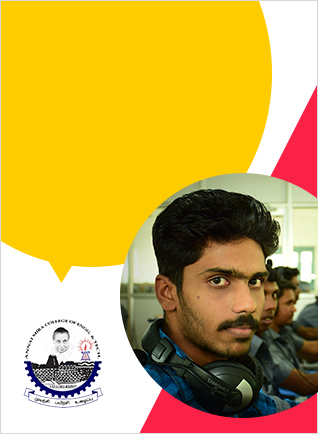
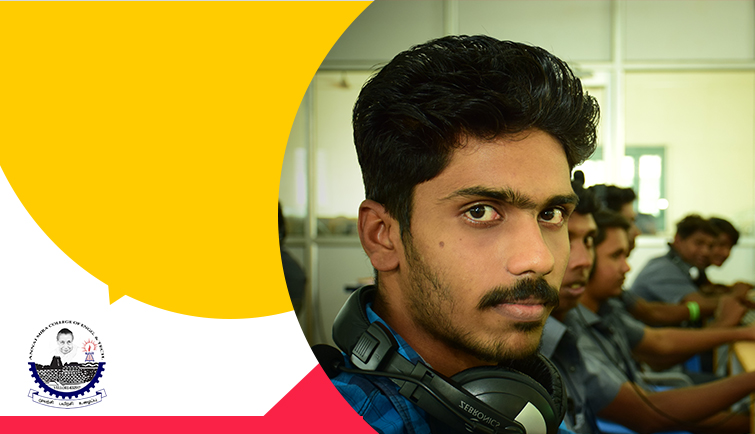
Ranked no.
4
in 314 Engineering
Colleges across
Tamilnadu


